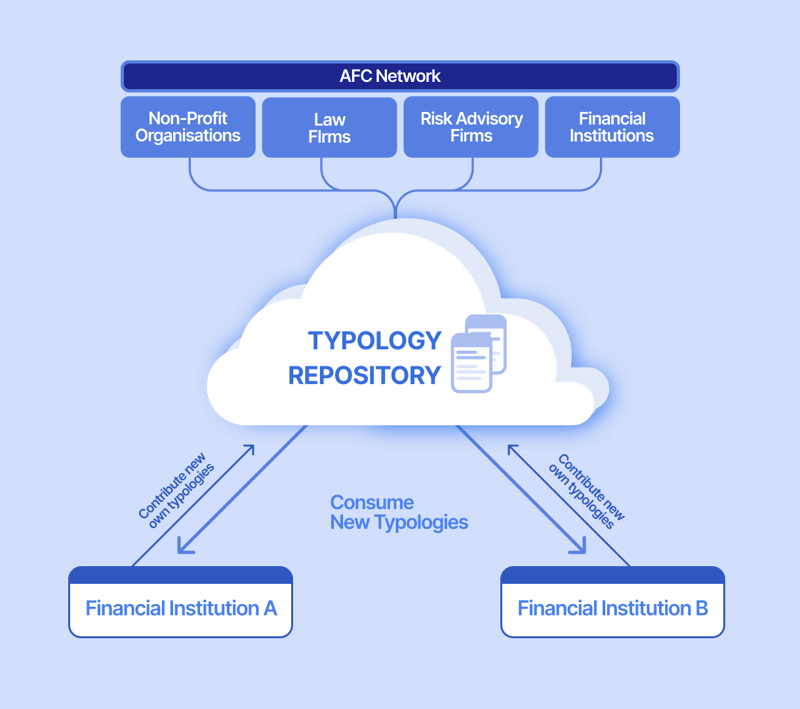Beyond Compliance: The Strategic Advantages of Using the AFC Ecosystem
In the traditional business landscape, compliance has often been viewed as a necessary but burdensome cost center—a set of regulations and protocols that organizations must adhere to, often reluctantly. This conventional wisdom casts compliance as a series of checkboxes to be ticked off, viewed more as an obstacle to business agility rather than an enabler of trust and operational excellence.
However, we are witnessing a paradigm shift in how businesses perceive compliance. Increasingly, forward-thinking organizations are recognizing that a robust compliance function can actually be a strategic advantage. This new perspective sees compliance not merely as a way to avoid penalties but as an avenue to build stronger customer relationships, foster trust, and even gain a competitive edge.
Enter Tookitaki's Anti-Financial Crime (AFC) Ecosystem—a groundbreaking solution designed not just to help financial institutions meet regulatory requirements but to excel beyond them. This technology-enabled, community-driven platform elevates the compliance function from a cost center to a source of competitive advantage. Stay tuned as we delve deeper into how the AFC Ecosystem extends its benefits far beyond the realm of mere compliance.
In this blog, we will explore how compliance, with the help of advanced tools like the AFC Ecosystem, can transition from being a grudging necessity to becoming a powerful asset in the strategic arsenal of modern businesses.
The Compliance Quagmire
Navigating the labyrinthine maze of compliance requirements is no small feat for financial institutions in today's complex and fast-paced business environment. The challenges come in multiple dimensions:
- Complexity: Financial institutions must adhere to a myriad of rules and regulations, often across multiple jurisdictions. This involves intricate procedures, exhaustive documentation, and often, specialized knowledge in areas like Anti-Money Laundering (AML) and Counter-Terrorist Financing (CFT) among others. The complexity is heightened further by the various products and services offered, each with its own compliance landscape.
- Cost: Staying compliant is not just labor-intensive but also a financial burden. Financial institutions must often invest in specialized personnel, ongoing training programs, and sophisticated technology platforms designed to help them stay ahead of the compliance curve. All of this translates to substantial operational expenses, making compliance appear as a financial sinkhole rather than an investment.
- Constant Regulatory Changes: To make matters worse, the regulatory landscape is not static. Authorities frequently update guidelines and introduce new regulations to address emerging risks and challenges. This fluid environment makes it difficult for institutions to maintain a stable compliance program, leading to reactive rather than proactive compliance management.
Given these challenges, it's not surprising that many organizations see compliance as a necessary but burdensome part of doing business. It becomes a reactive function—an emergency brake to be used only when absolutely necessary—rather than a proactive, strategic function that can actually steer the organization toward safer and more rewarding ventures.
Such a perspective, however, is limiting and outdated. The challenges are real, but they also represent opportunities for financial institutions to differentiate themselves in a crowded marketplace. For organizations willing to take a progressive view, modern compliance tools like Tookitaki's AFC Ecosystem offer a pathway to turn compliance from a perennial challenge into a strategic advantage.
 Shifting from Cost-Centric to Value-Centric Compliance
Shifting from Cost-Centric to Value-Centric Compliance
The traditional paradigm often pigeonholes compliance as a cost center—a necessary but burdensome part of doing business that absorbs resources without generating revenue. This perspective, though understandable given the complexities involved, is a limited way to approach compliance. A shift in mindset is critical for leveraging compliance as a competitive edge.
In a modern, interconnected, and rapidly evolving financial landscape, compliance can, and should, be seen as a value center. What does this mean? Simply put, a value-centric approach to compliance involves viewing it not merely as a set of rules to be followed, but as a strategic function that informs decision-making, minimizes risk, and can even open new business avenues.
- Strategic Risk Management: A sophisticated compliance system enables a financial institution to have a deeper understanding of the risks associated with different types of transactions, partners, and business models. This knowledge can guide better decision-making and risk management, reducing costs associated with fines and reputational damage.
- Customer Trust: In a world where news of data breaches and financial scandals can spread like wildfire, being a trusted institution can differentiate you from competitors. Demonstrable commitment to compliance can elevate a brand's image, turning compliance into a unique selling proposition.
- Business Agility: When a compliance system is flexible and adaptable, financial institutions can more quickly take advantage of new opportunities. They can enter new markets or launch new products with the confidence that they can meet the associated regulatory requirements efficiently.
Modern technology platforms like Tookitaki's AFC Ecosystem embody this value-centric approach. By combining cutting-edge technology with a community-driven model, it not only keeps financial institutions ahead of the regulatory curve but also equips them with insights and best practices from a diverse network of experts. The AFC Ecosystem ensures comprehensive risk coverage, scalability, and significantly reduced operational costs. In essence, it turns compliance into not just a defensive play but a strategic advantage, aligning it closely with business goals and revenue generation.
So, it's time for organizations to reevaluate their compliance strategies and shift from a cost-centric to a value-centric model. After all, in today's complex financial ecosystem, compliance isn't just about avoiding fines—it's about creating value.

The AFC Ecosystem: Not Just for Compliance
While compliance remains at the heart of Tookitaki's AFC Ecosystem, it offers a multifaceted array of benefits that go far beyond merely ticking off regulatory checkboxes. It addresses a broader scope of challenges, thereby enhancing an institution's strategic capabilities. Here's how the AFC Ecosystem contributes more than just compliance.
Risk Management
In the traditional sense, compliance is often viewed as a reactive measure to prevent violations. The AFC Ecosystem flips this narrative by offering a proactive, holistic approach to risk management. By leveraging a Federated Knowledge Base and a comprehensive Typology Repository, it provides a 360-degree view of the entire risk landscape. Financial institutions can identify new risk parameters, spot emerging trends in financial crime, and tailor their operational models accordingly. The end result is a much more dynamic, real-time approach to risk mitigation.
Customer Trust
In today's digital age, trust is an invaluable commodity. Customers are increasingly concerned about how their data is being used and protected. The transparency and robustness offered by the AFC Ecosystem's community-driven model build customer confidence. Knowing that your institution is part of a proactive network committed to combating financial crime can serve as a significant trust signal to both existing and potential customers. Thus, compliance, when handled correctly, becomes a marketing point that sets you apart in a crowded marketplace.
Market Differentiation
While it's tempting to view compliance as a uniform requirement that levels the playing field, the reality is far different. How an institution manages compliance can be a strong differentiator in the market. Institutions that leverage the AFC Ecosystem's adaptive and collaborative capabilities can enter new markets more confidently and roll out innovative financial products more quickly. It's a key selling point to say, "We not only meet the industry standards, but we also actively contribute to setting them."
By extending its utility beyond compliance, Tookitaki's AFC Ecosystem serves as a multi-tool in a financial institution's toolkit. It's not just about avoiding penalties or meeting minimum requirements; it's about enriching the institution's entire operational framework. In doing so, the AFC Ecosystem allows financial institutions to transform what has historically been viewed as a burdensome obligation into a strategic asset with tangible benefits.
Networking & Collaboration
Another remarkable aspect of the AFC Ecosystem is its ability to foster a vibrant community of professionals and institutions. This is not just about compliance; it's about building a collaborative network that serves as a strategic asset for every member involved. Here’s how networking within the AFC Ecosystem can yield significant dividends for your business.
A Community of Experts at Your Fingertips
One of the primary draws of the AFC Ecosystem is its ability to bring together a diverse group of stakeholders—from financial institutions and regulatory bodies to risk consultants and technology partners. By joining this unique network, you gain access to an invaluable pool of expertise. Think of it as a specialized professional conference that's always in session, where you can glean insights from the leading minds in anti-financial crime.
From Networking to Business Insights
Imagine having a problem you're struggling to solve, and then discovering that someone in your network has already solved a similar issue successfully. The AFC Ecosystem makes this type of knowledge-sharing routine. It allows you to tap into a collective intelligence where strategies, challenges, and best practices are openly discussed. The insights gained here can dramatically shorten the learning curve for new regulatory adaptations and can inspire innovative solutions to age-old problems.
Opportunities Beyond Compliance
The shared intelligence within the AFC Ecosystem doesn’t just pertain to compliance issues. It offers insights into market trends, customer behavior, and technological advancements. These can be leveraged for product development, entering new markets, or refining your business strategies. In a way, your participation in this network can act as a lens, focusing scattered information into actionable business insights.
Networking as a Strategic Asset
Traditionally, compliance functions operate in silos, isolated from the rest of the business. The AFC Ecosystem breaks down these barriers by integrating compliance with networking. Relationships formed within this community can lead to strategic partnerships, joint ventures, or even mergers and acquisitions. The networking aspect of the AFC Ecosystem isn't a side feature—it's a core component that could open doors you never even knew existed.
In summary, the AFC Ecosystem’s networking and collaborative features transform compliance from a solitary endeavor into a community-driven initiative. By being a part of this forward-thinking network, financial institutions can elevate their compliance operations from a mandatory obligation to a strategic advantage, enriched with collective wisdom and collaborative opportunities.
Speed & Adaptability
In the ever-changing landscape of financial services, agility isn't just a perk—it's a necessity. The speed at which regulations change can be dizzying, and failing to adapt quickly can result in severe penalties or lost opportunities. In this context, the AFC Ecosystem stands out as an exceptionally adaptable tool. But its benefits go beyond mere compliance; they extend to providing a significant competitive edge in the marketplace.
Quick Adaptation to Regulatory Changes
The AFC Ecosystem is designed to be as dynamic as the regulatory landscape itself. With features like a continuously updated Typology Repository and Federated Knowledge Base, it allows financial institutions to swiftly adapt to new compliance regulations. Instead of months of analysis and development, new compliance scenarios can be onboarded in significantly reduced time frames, allowing your business to stay ahead of the curve.
Real-Time Insights for Real-Time Decisions
Through its community-based approach, the AFC Ecosystem provides real-time insights derived from a wide array of financial institutions. This makes it easier to identify emerging risks and take corrective actions instantly. In a world where lagging behind can result in missed opportunities or regulatory repercussions, the value of real-time information cannot be overstated.
Agility as a Competitive Advantage
In today's fast-paced financial world, the quicker a firm can adapt to changes, the more competitive it becomes. The AFC Ecosystem not only enables rapid responses to regulatory alterations but also provides the insights needed to seize new market opportunities. It gives financial institutions the agility to pivot their strategies effectively, thereby gaining a head start over competitors still tangled in the web of old-school compliance methods.
Leveraging Technology for Proactive Responses
The AFC Ecosystem employs cutting-edge technology like Federated Learning, AI, and machine learning algorithms to offer proactive rather than reactive solutions. This empowers institutions to not just respond to changes but to anticipate them, a crucial factor that sets market leaders apart from followers.
Unlocking New Business Avenues
While the primary function of compliance solutions like the AFC Ecosystem is to mitigate risks and ensure adherence to regulations, its agile and dynamic capabilities offer a unique advantage that often goes unnoticed—accelerating time-to-market for new products and services. This is a game-changer in an industry where speed and innovation are critical to remaining competitive.
Speedy Compliance Clearance as a Launchpad for Innovation
With traditional compliance systems, rolling out a new financial product or entering a different market segment could mean months—or even years—of preparation, review, and approval. The bureaucratic layers can be both cumbersome and costly. However, with an agile compliance function like the AFC Ecosystem, the red tape can be slashed substantially. It streamlines the vetting process for new product launches, ensuring you can take your innovations to market faster than ever before.
Scenario 1: Entering the Crypto Space
Consider the burgeoning field of cryptocurrencies, a market full of potential but also rife with regulatory landmines. Utilizing the AFC Ecosystem's extensive, up-to-date Typology Repository, a financial institution could quickly identify the typologies relevant to crypto transactions. This can expedite risk assessments, due diligence, and, ultimately, regulatory approval, allowing the institution to move into this high-reward sector far more quickly than would otherwise be possible.
Scenario 2: Expanding into Emerging Markets
Emerging markets offer incredible opportunities for financial institutions, but they also present unique compliance challenges. Regulatory landscapes can be extremely volatile, with frequent changes that can stymie even the most well-planned entry strategies. Here, the AFC Ecosystem's community-based insights and rapid adaptability can be invaluable. Access to shared experiences, risks, and typologies specific to these markets can significantly cut down research time, enabling quicker and safer market entry.
Scenario 3: Introducing New Financial Products
In the competitive world of fintech, being first-to-market with a new app or financial product can provide a significant advantage. The AFC Ecosystem's streamlined compliance functions enable organizations to assess the viability and regulatory requirements of new products swiftly, reducing the time from concept to market launch.
In summary, an agile compliance function isn't just about avoiding risks and penalties—it's a catalyst for innovation and market leadership. By reducing the time required for compliance vetting, the AFC Ecosystem frees financial institutions to focus on what they do best: innovating, expanding, and providing exceptional services to their clients.
Final Thoughts
Compliance, often viewed as a cumbersome cost center, is ripe for a reevaluation in the face of modern challenges and opportunities. This blog has aimed to shift that perspective, illustrating how compliance can indeed become a strategic asset when approached correctly. Rather than merely acting as a guardrail that keeps your business from veering into the regulatory abyss, a well-designed compliance function can serve as a launchpad for innovation, differentiation, and rapid market expansion.
The AFC Ecosystem stands as a compelling example of this paradigm shift. It offers a dynamic, agile approach to compliance that not only addresses the traditional concerns of risk management and regulatory adherence but also brings a multitude of strategic advantages. From facilitating invaluable networking and collaboration with field experts to enabling rapid adaptability in a fluctuating market, the AFC Ecosystem provides a comprehensive solution that goes well beyond the basic checkboxes of compliance.
In an industry where the only constant is change, the speed and agility afforded by the AFC Ecosystem can set you apart from the competition, offering a faster route to market for new products and a smoother entry into emerging markets. So, if you've been viewing compliance as nothing more than a necessary burden, it may be time to reconsider.
The future of compliance is strategic, and with tools like the AFC Ecosystem, you can elevate your operations from mere compliance to a robust strategy for business growth and market leadership. We encourage you to explore how the AFC Ecosystem can bring not just compliance but also competitive advantages to your financial institution.
Anti-Financial Crime Compliance with Tookitaki?



